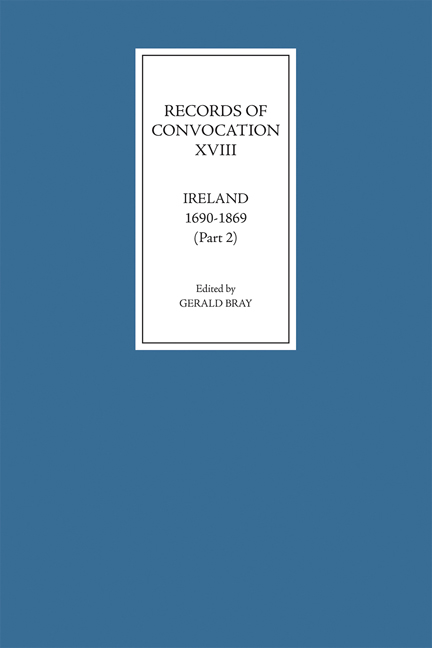Book contents
- Frontmatter
- Content
- Abbreviations
- Anne (1702-14)
- George I (1714-27)
- George II (1727-60)
- George III (1760-1820)
- George IV (1820-30)
- William IV (1830-7)
- Victoria (1837-1901)
- A table of proportions to be paid by the archbishops and bishops
- Prolocutors of the Irish national convocation, 1615-1869
- Membership of the convocation of the Church of Ireland
- Irish bishops in the house of lords, 1801-70
- The Nova Taxatio of Pope Nicholas IV in Ireland
- The Province of Armagh
- The Province of Cashel
- The Province of Dublin
- The Province of Tuam
- The Valor in Hibernia
- Irish clerical taxation
- Guide to source material
- The Irish convocation controversy, 1708-11
- Index of sources
- Index of references
- Index of names and places
- Index of subjects
- Bibliography
George III (1760-1820)
Published online by Cambridge University Press: 11 January 2024
- Frontmatter
- Content
- Abbreviations
- Anne (1702-14)
- George I (1714-27)
- George II (1727-60)
- George III (1760-1820)
- George IV (1820-30)
- William IV (1830-7)
- Victoria (1837-1901)
- A table of proportions to be paid by the archbishops and bishops
- Prolocutors of the Irish national convocation, 1615-1869
- Membership of the convocation of the Church of Ireland
- Irish bishops in the house of lords, 1801-70
- The Nova Taxatio of Pope Nicholas IV in Ireland
- The Province of Armagh
- The Province of Cashel
- The Province of Dublin
- The Province of Tuam
- The Valor in Hibernia
- Irish clerical taxation
- Guide to source material
- The Irish convocation controversy, 1708-11
- Index of sources
- Index of references
- Index of names and places
- Index of subjects
- Bibliography
Summary
Parliament (Irish)
Monday 10 March 1800.
In a private conversation with myself, the archbishop [of Cashel] treated that part of the article that mentioned the convocation as idle and foolish. Nothing, however, can be more essentially necessary to the identity of the churches. From the time that the clergy ceased to tax themselves in convocation, and mixed in that particular with the great mass of the people, by acquiring the right of voting at elections for the members of the house of commons, convocations have not been viewed in the same light as of old. But the calling together the convocation for ecclesiastical purposes, although entirely laid aside in this country, continues unaltered in England, and it is as regularly convened by the king's writ as the parliament. The archbishop talked of the absurdity of calling so many of the Irish clergy to London, but he forgot that the convocations are provincial, and the clergy to be convened int heir respective provinces. But what the archbishop seemed chiefly to reprobate was the idea of having any other representatives of the bishops in the united parliament than the four metropolitans. The idea of having a rotation of bishops he treated as absurd, inasmuch as it would be impossible for any bishop to make himself acquainted with parliamentary business during the short period for which he should sit in parliament.
Friday 21 March 1800.
Resolution XVIII of the committee for union:
Resolved that it is the opinion of this committee that for the same purpose it would be fit to propose that the churches of that part of Great Britain called England and of Ireland should be united into one church, and the archbishops, bishops, deans and clergy of the Churches of England and Ireland shall from time to time be summoned to and entitled to sit in convocation of the united church in like manner and subject to the same regulations as are at present by law established, with respect to the like orders of the Church of England and the doctrine, worship, discipline and government of the said united church shall be preserved as now by law established for the Church of England, and the doctrine, worship, discipline and government of the Church of Scotland shall likewise be preserved as now by law established for the Church of Scotland.
- Type
- Chapter
- Information
- Records of Convocation , pp. 193 - 204Publisher: Boydell & BrewerFirst published in: 2024

